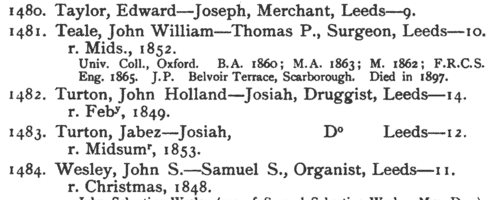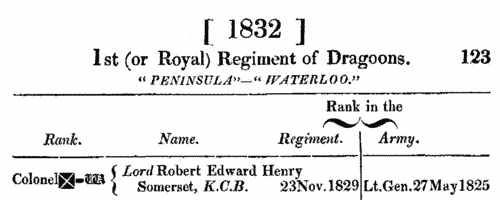Brook Surname Ancestry ResultsOur indexes 1000-1999 include entries for the spelling 'brook'. In the period you have requested, we have the following 1151 records (displaying 471 to 480): Single Surname Subscription | | | Buying all 1,151 results of this search individually would cost £6,700.00. But you can have free access to all 1,151 records for a year, to view, to save and print, for £100. Save £6,600.00. More... |
These sample scans are from the original record. You will get scans of the full pages or articles where the surname you searched for has been found. Your web browser may prevent the sample windows from opening; in this case please change your browser settings to allow pop-up windows from this site. Dissolutions of Partnerships
(1829)
Trade partnerships dissolved, or the removal of one partner from a partnership of several traders
BROOK. Cost: £6.00.  | Sample scan, click to enlarge

| Trustees and Solicitors
(1829)
Trustees appointed to take over bankrupts' estates, and their solicitors. Trustees are often friends or relatives of the bankrupt: and/or principal creditors
BROOK. Cost: £6.00.  | Sample scan, click to enlarge

| Inhabitants of Devon
(1830)
Pigot & Co.'s National Commercial Directory lists traders, farmers and private residents in the county.BROOK. Cost: £6.00.  | Sample scan, click to enlarge

| Inhabitants of Dorset
(1830)
Pigot & Co.'s National Commercial Directory lists traders, farmers and private residents in the county.BROOK. Cost: £6.00.  | Sample scan, click to enlarge

| Inhabitants of Wiltshire
(1830)
Pigot & Co.'s National Commercial Directory lists traders, farmers and private residents in the county.BROOK. Cost: £6.00.  | Sample scan, click to enlarge

| Revenue Coast Guard
(1830-1831)
Appointments 11 August 1830 to 11 August 1831:
1a. Return of all persons appointed to situations in the department of the Excise, and of persons nominated as expectants to receive instructions to qualify them to become officers: giving date of appointment or nomination; name; station; salary and emolument.
1b. Return of all persons re-appointed to situations in the Excise: giving name; station in which dropped; salary and emoluments; when and to what station re-appointed; salary and emoluments. This return is split into England, Scotland and Ireland.
2. Return of the different persons appointed to situations in the departments of the Customs: stating port; office; name of officer; when admitted; and salary and emoluments.
3. This return of men appointed to situations in the Revenue Coast Guard: with date of appointment; name; rank; salary; and emoluments.BROOK. Cost: £6.00.  | Sample scan, click to enlarge

| Boys entering Leeds Grammar School
(1832)
The admission books for Leeds Grammar School from 1820 to 1900 were edited by Edmund Wilson and published in 1906. The series of registers is almost complete for the period, there being in addition admission registers for the Lower (or Commercial) Department from 1856 to 1865, and lists of boys in the school in 1856, and in the Commercial Department in 1861. The entries are arranged by date or term of admission: a sequential number is given first, then surname, christian name, and, after a dash, father's christian name, occupation, and address; another dash, and then the age of the boy at admission, and often his year of leaving (with the abbreviation r. for 'removed' or 'left'). r.* means left without notice; (o) or S. or Stranger or Foreigner indicates a boy not on the foundation. The editor was unable to divine the meaning of the abbreviation (Q) or the asterisks prefixed to most entries in 1856 to 1860, but dutifully copies them into the text. In smaller type he then proceeds, where possible, to add some information about the boy's subsequent career.BROOK. Cost: £4.00.  | Sample scan, click to enlarge

| Cambridgeshire Voters: Caxton
(1832)
The poll on the election of three knights of the shire to serve in Parliament for the county of Cambridge, was taken at Cambridge, Royston, Newmarket, Ely, Wisbech and Whittlesea 18 and 19 December 1832. The candidates were Henry John Adeane esquire, Richard Greaves Townley esquire, Charles Philip Yorke esquire and John Walbanke Childers esquire. This poll book sets out the names of the voters in alphabetical order hundred by hundred and parish by parish. The voters' full names are stated, surname first. The right hand column records their votes. The new qualification for suffrage in the counties, after the passage of the 1832 Great Reform Bill, was the possession of a freehold estate worth 40s a year or more, a copyhold or long leasehold of £10 a year or more, or a tenancy or short leasehold of £50 a year or more.
BROOK. Cost: £6.00.  | Sample scan, click to enlarge

| Officers of the British Army
(1832)
The annual Army List, published By Authority, first lists officers of the rank of major and above, by rank, and with dates of appointment to each successive higher rank; holders of crosses, crosses with clasps (with number of clasps indicated), medals, medals with clasps (with number of clasps indicated) are marked as such; and an ornate W indicates those officers actually present in any of the actions of 16, 17 or 18 June 1815 and therefore awarded the Waterloo Medal. For each officer in this section, the final column notes his then present or immediately former regiment and/or office, if any. Next, all the officers of the army are listed, down to the rank of ensign, by regiment or corps, giving rank, name, date of rank in the regiment, and date of rank in the army, with occasional further notes. Again, holders of medals are duly noted, as in the first list. For each regiment the paymaster, adjutant, quartermaster, surgeon and assistant surgeons are named, as well as the civilian agent; and the regimental motto, battle honours, and colours of the facings and lace of the dress uniform are stated. After the British regiments of the line, the officers of the West India infantry, the Ceylon rifles, the Royal African Colonial Corps, the Cape Mounted Riflemen, the Royal Newfoundland Veterans, and the Royal Malta Fencibles are given; then the officers of the garrisons and other military establishments in Great Britain, Ireland, North America and Gibraltar (with Malta); the Royal Artillery; Commissariat Department; Medical Department; Chaplains' Department; officers retained on full pay; officers on British half pay; and officers on Foreign half pay (including the German Legion, the Brunswick Cavalry, the Brunswick Infantry, Chasseurs Brittaniques, Corsican Rangers, Dillon's Regiment, the Greek Light Infantry, Malta Regiment, Meuron's Regiment, Roll's Regiment, Sicilian Regiment, Watteville's Regiment, and the York Light Infantry Volunteers).BROOK. Cost: £4.00.  | Sample scan, click to enlarge

| Voters in the Eastern Division of Norfolk, for the parish of Diss
(1832)
Under the Reform Act of 1832, the County of Norfolk was allotted four Members of Parliament, being two Knights of the Shire for the Eastern Division and two for the Western. The Eastern Division included the hundreds of Blofield, Clavering, Depwade, Diss, Earsham, North Erpingham, South Erpingham, Eynsford, East Flegg, West Flegg, Forehoe, Happing, Henstead, Humbleyard, Loddon, Taverham, Tunstead and Walsham. The franchise was available to freeholders worth 40s a year or over; copyholders and long leaseholders of £10 or more; short leaseholders and tenants of £50 or more: but limited to adult males. Voting took place on 20 and 21 December 1832. This poll book lists the voters for each parish, with the votes cast. Voting was not compulsory, and non-voters are not listed. Each voter had two votes: the votes are indicated in the columns C. (Lord Henry Cholmondeley, 2852); P. (Nathaniel William Peach, 2960); K. (Hon. George Keppel, 3261); and W. (William Howe Windham, 3304). The voters were not necessarily resident in the parish, but derived their franchise from the land there; so some of the names have addresses outside the parish. After the name there may appear the abbreviations cop. for copyholder; oc. for occupier; or le. for leaseholder: the rest are freeholders or annuitants.BROOK. Cost: £6.00.  | Sample scan, click to enlarge

|
Research your ancestry, family history, genealogy and one-name study by direct access to original records and archives indexed by surname.
|












